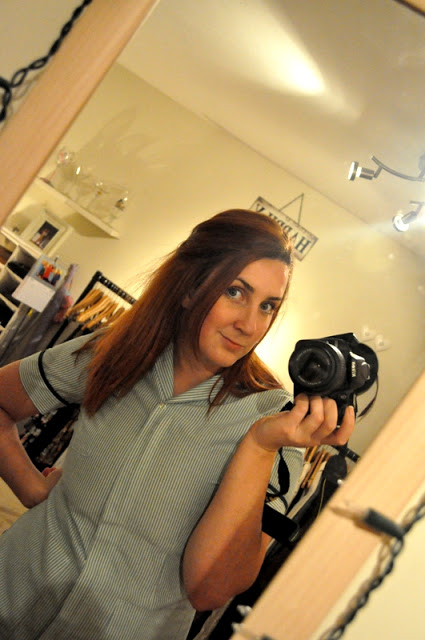Career Inspiration is a new series here on Prettygreentea. I’m spending my evenings interviewing and having a good old chat with inspirational and hard-working people from the blogging world. The aim of these interviews is to help those of you looking for career inspiration or simply a kick of motivation.
It’s very hard to know what you want to do in life and I’ve always loved finding out about what others do and the journey they took to get there. So, I hope you enjoy today’s interview with the fantastic Stephanie Large, a Veterinary Nurse.
Firstly, could you give us a brief explain of what veterinary nursing is?
Google description: Veterinary nursing is the supportive care of animals receiving treatment within a veterinary practice. A works as a member of the team, providing expert care for sick animals. also play a significant role in educating owners on maintaining the health of their pets.
I always say we’re like human nurses. The eyes, ears and sometimes common sense to the Vets. As well as supporting them we’re caring for and supporting the patients in hospital and as day patients.
When did you realise you wanted to be a veterinary nurse?
Fairly late on. When I decided I had enough of people in the retail industry I started to look into animal care jobs. Honestly, a Veterinary Nurse isn’t even a job I knew or thought a lot about. After much research I went back to college at 19 and got a few extra grades so I could apply for the course and try to get a training job.
Is there more than one training route and are there any entry requirements?
There’s basically two ways to get into it, but the second way will depend on the college and training practice you work with.
The first route is university, so general grades will apply to get in (usually concentrating on the sciences and maths). It’s a 4 year course, at university, with placement but generally a lot of theory work. Degree students aren’t known as “better” in the VN industry, nor do they (usually) get paid a lot more.
The second option is through a training practice, you apply to the practice that is known by the RCVS (Royal College of Veterinary Surgeons) as somewhere you can learn to become a VN. You need your GCSE’s A – C, again the sciences and maths are important. If you’re an older student then other qualifications or experience in the animal care field will help you highly.
I did the in-practice route, where I went to college once a week and then trained at work. I was employed full time, and I also had to finish my portfolio of practical assignments through that time too. The general training time is 2.5 – 4 years (depending on how your college works). I struggled a lot, so it did take me the 4 years, but the experience I got in that time worked well when I eventually became qualified. I chose to do it this way mainly because of money, at 19 I was established as working full time and having my own money and time, so going back to uni just wouldn’t have worked. However, it’s not a path way to discourage.
What is a typical work day like?
A typical working day for me will depend if I’m in kennels, or in prep with the operations. I work at an orthopedic referral practice, and so we have two lots of operations happening at once. Drawing pre-medications up, giving medications, taking x-rays, monitoring anesthetics, clipping and prepping for operations, passing kits for operations and scrubbing in for operations. Cleaning and tidying is also a huge factor, Vets are known to make a mess and you’re the ones that have to sort it. As well as cleaning the theaters down every night, checking oxygen and anesthetic trolleys, filling up stock and packing the kits away for the next days operations.
What’s your favourite part of your job?
When you’re in kennels you’re with the animals more, both day patients and long term hospital ones. Giving medications, walking, giving physio and other care they may need. Cooking and sorting out meals, again cleaning the kennels, the floors and washing and drying the beds the animals use.
I love having a patient go home that you’ve cared for, and see them improve and go home well. It’s lovely to know you’ve made that happen.
What is the most challenging part of your job?
The sadness that comes with it. Having to be a part of putting animals that are cared pets to sleep is never easy. Also the uncertainty of it all, an emergency could come in at any time. Over time is done on a weekly basis and some times daily, you can’t just leave if there are things to do. Even on a Friday evening when pizza and wine is a’calling!
What keeps you motivated?
My team keep me motivated a lot, if I didn’t work with the girls I do, it would certainly be a lot harder. Also the love you get from the patients and knowing what you do actually means something.

When did you start your blog, Stephanie Dreams and does it play a part in your career?
I think I’m on year 4, December is my 5th year blog Birthday- crazy! My job doesn’t come into it, however the lifestyle side and me featuring the dogs works well. I’ve worked with a few wonderful pet stores and my woofers appreciate the items they’ve had to feature.
Finally, do you have any tips for others thinking about veterinary nursing?
Look into the different options, and what would work best for you. Start getting work experience in any sort of animal care to show that you’re willing, and be sure that it’s something you want to do. The pay isn’t great, the hours are long and you work HARD!
Thank you so much to Stephanie for taking the time to answer a few questions. I wish you the best of luck with your career in 2015 and hope you’re enjoying your new married life (make sure you check out her beautiful wedding photos). You can find Stephanie over at her lifestyle and fashion blog – Stephanie Dreams, Twitter, Instagram, Pinterest, Google+ and YouTube.
If you would like to take part in my Career Inspiration series then just drop me a message on Twitter and we’ll get it sorted.

